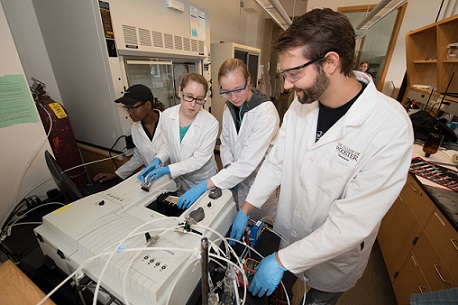
Tapping into a Cloud

WOOSTER, Ohio – How do you measure the inside of a cloud? Catching a cloud and trying to understand what’s inside is what Jennifer Faust, assistant professor of chemistry, and her students are actually doing by collecting rainwater on the rooftop of Severance Hall. Short of setting up a tower on Mount Jungfraujoch in Switzerland or using an airplane, “Clouds are hard to measure,” says Faust, an atmospheric chemist interested in the implications of cloud composition on climate and health. “Rainwater gives us a clue to the composition of the clouds,” she explained.
During the wet spring of 2018, she put together a team of students to study the carbon cycle. Their research focuses on organic compounds emitted into the atmosphere by human and plant activity. “The organic compounds react with other particles in the atmosphere and form clouds. Rainwater is how that organic matter comes back to the earth. We’re looking at what’s present in the water and how the organic molecules are transformed when they react with gases in the atmosphere,” she said.
For Jenelle Booker ’21, Kevin Wokosin ’18, Shayna Vicker ’21, and Brittany Bowman ’19, this summer’s study offers hands-on research in the field of environmental science. “When I think about environmental science I think about plants and soil but not the atmosphere, so I think it’s a really interesting part to address, the air we breathe,” said Booker.
Like Booker, Wokosin, who graduated this spring and is interested in environmental education, enjoys applying science in an environmental context. ‚ÄúThat‚Äôs an exciting part of the work that we do, using real rainwater samples to study the environment that way,‚Äù he said. Completing his senior Independent Study with Faust, Wokosin had the opportunity to work with her to set up her lab at ‘√…´ ”∆µin her first year. ‚ÄúHaving to start from scratch and explore different types of equipment and methods has allowed me to learn more,‚Äù he said, explaining that he and Faust built an instrument that they could use to measure the reactions of the molecules in the rainwater as they interact with the atmosphere.
Through support from the Sherman Fairchild Program, Faust has been grateful to be able to hire graduating and rising seniors as well as sophomore students to be a part of the research team. “There’s this mentoring tree going on. Kevin was my I.S. student so he’s pretty much an expert in what’s going on, and he’s been working with Shayna who’s gradually becoming more independent as well.”
“I’m not super-experienced with chemistry,” said Vicker. “I’ve enjoyed doing the research and having unexpected results or even expected results that require more research. As a first-generation college student, I came in knowing nothing about college, and it’s been different than what I expected in a good way. Having this experience is preparing me for the future.”
Faust teaches her students to find their independence and to see themselves as scientists. “I start off in the lab with them. We meet and talk about the experiments, set them up, and review and analyze the data together. As they get more experienced, they start thinking about the next steps, what the data mean, and we talk about it together but usually they’ve already figured out a path forward. For me, mentoring is about developing their skills to think as independent scientists, developing chemical intuition, thinking on a molecular level, as well as developing all around problem solving skills,” she said.
Through analyzing the rainwater captured over Severance Hall, Faust and her students are working to understand how the chemicals present affect ecological and human health and how reactions of these chemicals could affect the atmosphere. “Looking more at cloud chemistry helps climate modelers to predict how the temperature of earth will change in the future and inform policy decisions, agricultural practices, or other implications,” said Faust.
To Booker, it’s how the research being done now could impact the future that takes on the most importance, “The atmosphere is something we breathe all the time,” she said. “It’s important to do this research now so later scientists can find the tools to actually solve the problem.”
Posted in Experiential Learning on August 10, 2018.
Related Posts
Related Areas of Study
Chemistry
Access to labs, research opportunities, and small classes give chemistry majors lots of options after graduation.
Major Minor

